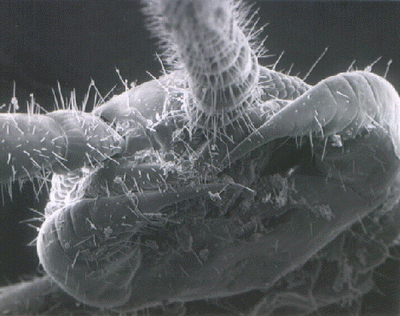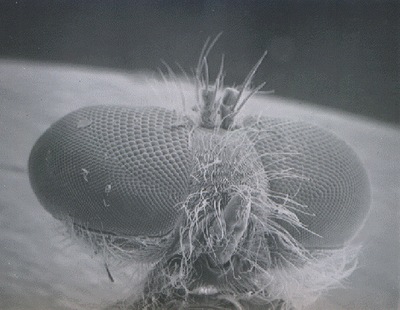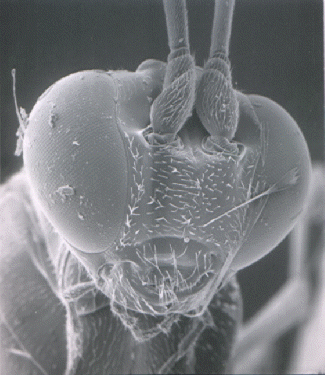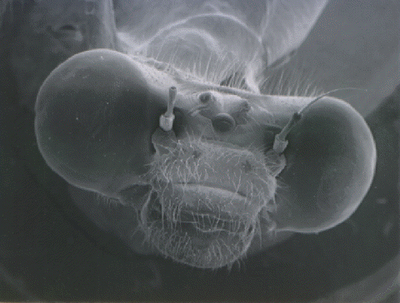This is a large family, with over 4,950 species in the world, of which 400 live in America. They have many habitats, most are wet or humid areas. Many specieis have regular flying paths and alight on favorite perches. Most damselflies are brightly colored, with shades including violet, green, red, black, blue, bronze, and orange. males are usually more brightly colored than females. Their wings are clear and many-veined. Most species are between 1 and 1 1/4 inches in length. The head is mostly occupied by large compound eyes. The antennae are short, bristly, and inconspicuous. They feed on other insects they capture while flying. Odonata are carnivourous, they have chewing jaws, and keep insect pests under control by feeding on mosquitoes, midges, etc. They may attempt to bite people, but only large dragonflies can inflict a painful bite.
Enlarged 120 times
 Centipede
CentipedeCentipede's are flat, wormlike creatures with one pair of appendages for each body segment. The antennae on a centipede has at least fourteen or more segments. The first set of appendages behind the head are clawlike, and are called poison jaws. These jaws are used to trap and paralyze their prey, usually small insects. Centipede's can easily be found in soil, under bark, rotting wood, and other debris. Small centipede's are harmless to man, but the larger ones can give quite painful bites. American centipede's can range in size from a few millimeters to just over six inches in length. Their color varies in species from pale yellow to dark brown. Two families make up the order Lithobiomorpha. The difference between the two families can be determined by using and comparing the eye structures of each.
Enlarged 120 times
 House Fly
House Fly
This is a large group of insects. There are more than 700 species in North America alone and the members can be found almost anywhere. The house fly breeds in filth of all kinds. It does not bite. The mouth parts are for sucking only. the fly secretes digestive juices on what it wants to eat, the digestive juices partially digetst the food, then the fly sucks up the liquid. Flies are soft-bodied, and go through complete metamorphosis.
Enlarged 120 times

WASP
This is the largest family of insects. There are more than 3,000 species in North America. Many are brightly colored with black and yellow. Unlike some wasp families, these wasps do not sting. They lay their eggs in wood or in other insects. The family Ichnemonidae is divided into tribes, each tribe has a specific insect that it likes to prey on. Some species have been imported into American to control insect pests.
Enlarged 120 times

EEEEWwwwwwwwwww Bugs >.<
ReplyDeleteUgly???
ReplyDeleteThey look cool to me.
The centipede is just a little too hairy.
that iz grosssssssssssssssssssssssssssssssssssssssssssssssss
ReplyDeletei hate bugs & crepi crawliz
bugs r ite but dang y they gotta be sooooooooooooooo dang stupid and run into tha bug zapper all tha time but they sorta get annoying too but anyways byyyyyyyyyyye!!!!!
ReplyDeleteP.S. 8=D
I have one thing to say to whoever posted at 7:00 AM:
ReplyDeleteYoure a friggin idiot.
That is just disgfuisting. I know some people are going to be like why are you looking at it then. It is for a school prpject. I'm looking for a REALLY COOl insect to research on and do a project on so this is for you obnoxious people.
ReplyDelete